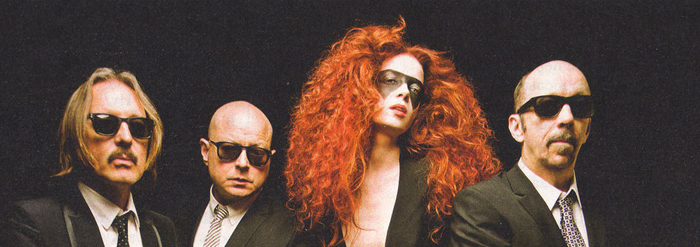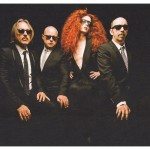
Shirley Manson by Debbie Harry
The article below has been snatched from the fashion spot forums. It has been translated from Russian.
The band Garbage is returning after a seven- year lull. In contrast to other heroes of the past that are chasing big dollars, this reunion is in earnest and for the long-haul.
For the 1990s generation, Garbage—the brain¬child of singer Shirley Manson and Butch Vig, pro-ducer of Nirvana’s “Nevermind” album—was an em¬blematic, if not lethal hallmark. Girls tried their first taste of love to the songs “Stupid Girl” and “Melt” and opened a new, adult world for themselves, as so precisely defined in the soundtrack to the James Bond movie “The World is Not Enough”. On the eve of the release of the group’s new album, the red¬headed rogue Shirley Manson—the face, voice and style of Garbage—talked with Debbie Harry, the founder of legendary group Blondie, which was an inspiration for Shirley. It turns out that much unites the two singers.
DEBBIE: Gosh, we haven’t seen each other in six years!
SHIRLEY: Yes, the last time we were in the same room was at the Rock and Roll Hall of Fame, when you were inducted—in 2006, I think.
DEBBIE: And you gave me the best speech in history. So sweet!
SHIRLEY: I think that if anyone on this planet deserves to be immortalized, it’s you. You know, I still have a portrait of you above my bed. I wake up and go to sleep with you.
DEBBIE: Outstanding. Where have you been hiding all this time?
SHIRLEY: Well, I decided to crawl from under my little shell and after seven years take another swing at this thing.
DEBBIE: Why did you want to come back?
SHIRLEY: A feeling of not being done, like I have something left in the tank.
DEBBIE: A lot of people are already shaking with anticipation. What direction do you think your music is taking?
SHIRLEY: I guess our current music resonates with the energy of early Garbage. Some people who have heard the new album said that it reminds them of our first record. We took so much time off that over these years we were able to regenerate. There are moments when you realize that there’s nothing else to be done. But the record label wants you to make a new album even if you’re not ready. We balked at that pressure, came off the road, and decided to simply live.
DEBBIE: Yeah, but then that crative itch appears… I knew that you were working on a solo project and then I lost contact with you. But I al¬ways knew you wanted to continue to do music. You have something to say, and people want to hear you.
SHIRLEY: I was surprised to take so much time. I thought my seat at the rock-n-roll table would al-ready be filled. It’s not a positive place to be but that’s how I felt. But then I was surprised to find that no one had replaced me. When I was growing up, there were so many rebellious women singers like yourself, Chrissie Hynde (The Pretenders), Pat¬ti Smith…I grew up with that music. In the last de¬cade very few women have verbally rioted against pop music. I love pop music, don’t get me wrong, but balance is important.
DEBBIE: I agree, it’s not an easy time for rock. The market is oriented toward pop, lots of girls per-forming now more resemble showgirls than artists.
SHIRLEY: Yes, it’s like watching a Broadway show. Like I said, I grew up with punk.
DEBBIE: OK, girl, are you ready to be punking it out?
SHIRLEY: Well, I am not a pony and I’m not a showgirl. I will only do what I know how to do.
DEBBIE: You were always rebellious, but I like to describe it as inquisitive or strong-minded.
SHIRLEY: I am ready to be disagreeable, but that’s the role of any artist. The showgirl performers today, they work hard, smile, dance, sing, in some ways they are unstoppable. But this is small-mind- ed—it leaves no room for fear or melancholy.
DEBBIE: Then I want to hear some heavy stuff from you!
SHIRLEY: At least the new Garbage record is very guitar-driven. It’s a rock record, there’s no mis-taking that.
DEBBIE: During childhood, did you think you would play in a band?
SHIRLEY: No way! I was an ordinary girl who sang in a choir, went to ballet class, and then acci-dentally drifted into this alternative universe.
DEBBIE: Before Garbage you sang in the band Goodbye Mr. Mackenzie, right?
SHIRLEY: Do you remember, we toured with you in Europe! Meeting you was like touching a godly rock star. I remember we were stuck in a lift together in Liverpool, before our first concert.
DEBBIE: Gosh, I remember that too!
SHIRLEY: The elevator doors opened, you walked in, and I thought I was going to fall on the floor. I was so freaked out! You greeted me, and I couldn’t utter anything. But from that moment you began to support me.
DEBBIE: All my life I’ve been meeting people in elevators. Once I met Jimi Hendrix in an elevator, and believe me, I was the speechless one.
SHIRLEY: In Goodbye Mr. Mackenzie I played keyboards and sang back-up vocals. And Gary Kur- furst (Blondie’s manager.—Interview) came to me and asked: “Have you ever thought about fronting a band?” I was like: “No!” But it planted the seed in my head.
DEBBIE: He always had a great ear for rock. Gary could listen, he had impeccable taste, and he spoke very highly of you. He always said that you’re one of the most talented singers on the planet.
SHIRLEY: He also advised me to learn from you, to try to be like Blondie. He always believed in us.
DEBBIE: We all struggle with low self-esteem, so support from others is important. Are you strong¬ly affected by criticism now?
SHIRLEY: As I’ve gotten older, I realized that it was a dreadful waste of time. It’s very easy to feel like you’re not worthy. Today I can say that I’m good enough. And this really motivates me.
DEBBIE: Oh, that’s so great. Sometimes you need to take a step back and have perspective.
SHIRLEY: It’s weird, when we came off the road seven years ago, I decided that Garbage was done. Time passes and you begin to understand who you are and what you need. I read Patti Smith’s book “Just Kids” and that triggered some¬thing in me. Patti is really all about not giving up. About that true connection to art. She fired me up, so now I am ready to say the hell with it and start again. And I’m not afraid of anything. Our new album is called “Not Your Kind of People”, and it is about our entire careers. We were outsiders. Insiders, hipsters never accepted us. Kind of like Blondie, I think…
DEBBIE: Perfect name! “Not Your Kind of People” sounds like Velvet Underground. Trust me, at the time, no one wanted to be like them.
SHIRLEY: I’m also a little worried about the heavy physicality of touring. I did it since I was 15 and never stopped, always took it for granted. But you really have to be fit to do this. It’s a hard job.
DEBBIE: Yes, it’s very athletic for sure. Speak¬ing of, you did some modeling? I remember seeing you on billboards.
SHIRLEY: To make money I used to model for art school students. When Garbage became success-ful, Calvin Klein called me and asked me to do an advertising campaign with him. But that’s part of the fun, when after hearing your music people begin to want you. Suddenly, everyone dreams of seeing you in their films and TV shows.
DEBBIE: Not everyone could agree to it. You acted in the series “Terminator: The Sarah Connor Chronicles”.
SHIRLEY (laughs): That was more at the ab¬surd, rather than brilliant end of my career. I had no idea what I was getting into. I definitely have more respect for actors now. It’s extremely hard work. I said yes to that TV show before I knew what I would be experiencing.
DEBBIE: But you were in drama group as a child, right?
SHIRLEY: Do you remember your first acting job? It’s terrifying. Was it “Hairspray” for you?
DEBBIE: No, my first serious part was in “Union City”, and I had loads of cameos before that. It’s nerve-wracking, but if you’re sure of yourself, you’ll manage.
SHIRLEY: Everyone’s creative path is defined by actually not being afraid to look like a fool in a particular moment. That’s the key to any good career. Are you willing to take that risk of falling?
DEBBIE: Indeed…Did your religious upbring¬ing help you overcome many of these obstacles?
SHIRLEY: My dad was a Sunday school teacher.
DEBBIE: Gosh, I didn’t know that!
SHIRLEY: He was extremely religious, strongly bound to the church. He was ready to have philo-sophical debates with his eleven-year old daughter. He had the courage to disagree, and taught me to be curious. And what is more, to respect others’ beliefs. I’m not religious, but it’s good to know how to be empathetic.
DEBBIE: This sounds preposterous, I know, but I think that music is a lot like religion.
SHIRLEY: Yes, it’s a form of communal prayer. If you fall in love with a musician, a song or an album, then it’s forever. You never fall out of love with it.
DEBBIE: That’s right. You said that you were touring since you were 15. You had reason to take your recent break—you are not Superman after all. You simply have to recharge your batteries, lie on the beach, right?
SHIRLEY: I think that I had a fear of becoming irrelevant. Then I realized that I needed to get off this train and go home. It’s empowering to know that you can get back on that train. I don’t care if we sell a billion or ten records.
Shirley Manson by Debbie Harry | Interview Russia April 2012 HQs
ph: Autumn De Wilde
st: Marjan Malakpour
hair: Clyde Haygood
make-up: Donald Simrock




